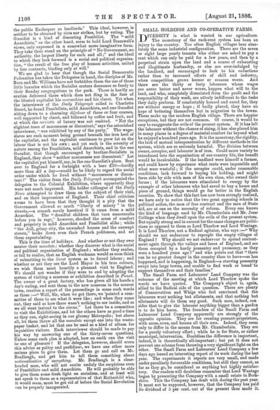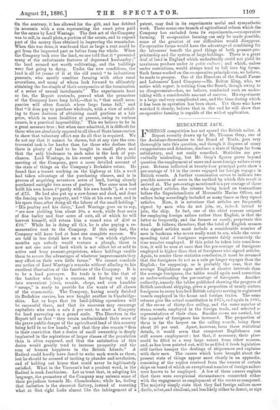SMALL HOLDINGS AND CO-OPERATIVE FARMS.
DIVERSITY is what is wanted in our agriculture. The monotony of the rack-rent system has been an injury to the country. Too often English villages bear abso- lutely the same industrial configuration. There are the seven or eight large yearly tenants who either are asked to pay a rent which can only be paid for a few years, and then by a perpetual strain upon the land and a course of exhausting and illegitimate husbandry, or else are over-indulged by the landlord, and encouraged to look to his reductions rather than to increased efforts of skill and industry, when competition grows keener or seasons worse. And there are the thirty or forty labourers whose wages are never better and never worse, happen what will to the land, and who, completely dissociated from the profit and the responsibility of their work, are utterly indifferent to the tasks they daily perform. If comfortably housed and cared for, they are without energy or hope ; if badly placed, they have no hope of bettering themselves but in migration to the towns.
These make up the modern English village. There are happier exceptions, but they are not common. Of course, it would be easy to exaggerate the evils of the present system. If it has left the labourer without the chance of rising, it has also placed him in many places in a degree of material comfort far beyond what he enjoyed a hundred years ago. It is the monotony, the rigidity, the lack of mutual interpenetration by different methods in the system, which are so seriously harmful. The division between owner, occupier, and labourer is of iron. Could more variety be introduced into the organisation of our country life, the benefit would be incalculable. If the landlord were himself a farmer, and could know by experience what rents were impossible and what were wasteful ; if the occupier could, under reasonable conditions, look forward to buying his holding, and might farm side by side with men of his own class, who owned their farms ; if the labourers were stimulated to energy by the example of other labourers who had saved to buy a house and piece of ground, things would go far better in the English counties. To show that this fact has now been strongly realised, we have only to notice that the two great opposing schools in political action, the men of free contract and the men of State aid, are at one on the necessity of reform. Every one knows the kind of language used by Mr. Chamberlain and Mr. Jesse Collings when they dwell upon the evils of the present system. But equally strong and in earnest for the same changes are politi- cians so opposed to them as Lord Thurlow and Lord Wantage. It is Lord Thurlow, not a Radical agitator, who says :—" Why should we not endeavour to repeople the empty villages of England ? Why should we not endeavour to spread content- ment again through the valleys and lanes of England, and see them occupied by a hardy peasantry and yeomanry, as they were a hundred years ago ?" and who points out that " there can be no greater danger in the country than to have—as -has happened, and is happening, in England—a starving peasantry swept into large towns, and unable to find work or bread 'to support themselves and their families."
The Small Farm and Labourers' Land Company was the outcome of the meeting at which Lord Thurlow spoke the words we have quoted. The Company's object is, again, allied to the Radical side of the question. There are plenty of Conservatives and Whigs who feel convinced that the labourers want nothing but allotments, and that nothing but allotments will do them any good. Such men, indeed, con eider that to give the labourer anything bigger than a garden is to do him harm. The founders of the Small Farm and Labourers' Land Company apparently are strongly of the opposite opinion. They are for creating peasant-proprietors, with acres, cows, and houses all their own. Indeed, they seem only to differ in the means from Mr. Chathberlain. They are for a purely voluntary effort ; while he is for State, or rather municipal, intervention. Doubtless the difference is important, indeed, it is theoretically all-important ; but yet it does not prevent one scheme from throwing a very significant light on the other. The Small Farm and Labourers' Land Company a few days ago issued an interesting report of its work during the last year. The experiments it reports are very small, and made under peculiarly favourable conditions, but still they cannot, as far as they go, be considered as anything but highly satisfac- tory. Our readers will doubtless remember that Lord Wantage began by presenting the Company with a small estate in Berk- shire. This the Company has dealt with during the past year. It must not be supposed, however, that the Company has paid its dividend of 5 per cent. out of the present thus made it. On the contrary, it has allowed for the gift, and has debited its accounts with a sum representing the exact price paid for the estate by Lord Wantage. The first act of the Company was to sell, in small plots, a portion of the estate, and to expend part of the money thus obtained in improving the remainder. When this was done, it was found that as large a rent could be got from the improved part as before from the whole. When the Company took over the land, we are told that it "presented many of the unfortunate features of depressed husbandry ;" the land seemed not worth cultivating, and the buildings were fast going to decay. Under the new conditions, the land is all let (some of it at the old rents) " to industrious peasants, who mostly combine farming with other rural avocations, and many of whom look forward to ultimately obtaining the fee-simple of their occupancies at the termination of a series of annual instalments." The experiments have so far, the Report contends, proved what the promoters of the Company have long held,—that is, " that small occu- pancies will often flourish where larga farms fail," and that "it does pay to purchase wholesale, with a view of retail- ing to those desirous of obtaining small portions at a fair price, which in most localities at present, owing to various causes, is a practical impossibility." This we believe to be in a great measure true ; but when once admitted, it is difficult for those who are absolutely opposed to all idea of State intervention to show that voluntary effort can do all that is required. We do not say that it cannot be shown, but at any rate the con- troversial task is far harder than for those who declare that there is plenty of land to be bought in small plots, and that the only hindrance to such sales is the lack of pur- chasers. Lord Wantage, in his recent speech at the public meeting of the Company, gave a more detailed account of the state of things on the Company's Berkshire estate. He found that a tenant working on the highway at 12s. a week had taken advantage of the purchasing clauses, and is in process of acquiring seventeen acres of land, having already purchased outright two acres of pasture. The same man had built his own house (" partly with his own hands "), at a cost of £75. He had also put up a cow-house and shed, and done the fencing on his property, and " this at his own cost, and in his spare time, after doing all the labour of the small holding."
His poultry and his dairy," Lord Wantage goes on to say, " are now yielding him about 20s. a week, while four acres of fine barley and four acres of oats, all of which be will harvest himself, will return him a round sum of £50 or £60." While he is doing all this, he is also paying a re- munerative rent to the Company. If this only last, the Company will have had at least one complete success. We are told in less detail how on a farm " on which eighteen months ago nobody would venture a plough, there is now not one acre of land which is not either let or sold to active and busy peasant-proprietors, whose holdings enable them to secure the advantages of whatever improvements they may effect on their own little farms." We cannot conclude our notice of Lord Wantage's remarks without alluding to his excellent illustration of the functions of the Company. It is to be a land purveyor. Its trade is to be like that of the butcher who buys a carcass, and having cut it up into convenient joints, rounds, chops, and even humbler scraps," is ready to provide for the wants of all classes of the community. The Company, having nearly finished its Berkshire carcass, has now bought another in Cambridge- shire. Let us hope that its land-jobbing operations will be successful there, and that its successes may encourage capitalists who seek a safe 5 per cent. to start a Company for land purveying on a grand scale. The Directors in the Report tell us that " they retain undiminished their sense of the grave public danger of the agricultural land of this country being held in so few hands," and that they also remain "firm in their conviction that a desire of small ownership is deeply implanted in the aspirations of larger classes of the population than is often supposed, and that the satisfaction of this desire would greatly tend to increase prosperity and the sum of human happiness in the British Islands." A Radical could hardly have dared to write such words as these, lest he should be accused of inciting to plunder and revolution, and of holding out hopes that could never be legitimately satisfied. What in the Viscount's but a prudent word, in the Radical is rank Jacobinism. Let us trust that, in adopting his language, the promoters of the Company may unlearn some of their prejudices towards Mr. Chamberlain; while he, feeling that imitation is the sincerest flattery, instead of resenting what at first sight looks almost like the infringement of a patent, may find in its experiments useful and sympathetic work. There seems one branch of agricultural reform which the Company has excluded from its experiments,—co-operative farming. If co-operative farming can only be made possible, some of the greatest of our difficulties would disappear. Co-operative farms would have the advantage of combining for the labourers' benefit the good things of both peasant-pro- prietorship and the system of large holdings. There is a great deal of land in England which undoubtedly could not yield its maximum produce under la petite culture ; and which, unless under restrictions, would always tend to fall into big farms. Such farms worked on the co-operative principle can, we believe, be made to prosper. One of the Directors of the Small Farms and Labourers' Land Company—Mr. Bolton King, who, we notice with regret, is retiring from the Board, though owing to no disagreement—has, we believe, conducted such an under- taking with a considerable amount of success. His experiment is a large and very complicated one, and the time during which it has been in operation has been short. Yet those who have watched it closely, believe that in the end he will show that co-operative farming is capable of the widest application.



































 Previous page
Previous page